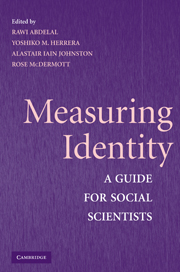Book contents
- Frontmatter
- Contents
- Contributors
- Introduction
- I DEFINITION, CONCEPTUALIZATION, AND MEASUREMENT ALTERNATIVES
- II SURVEY METHODS
- III CONTENT ANALYSIS AND COGNITIVE MAPPING
- IV DISCOURSE ANALYSIS AND ETHNOGRAPHY
- V EXPERIMENTS
- 12 Psychological Approaches to Identity: Experimentation and Application
- Bibliography
- Index
12 - Psychological Approaches to Identity: Experimentation and Application
Published online by Cambridge University Press: 05 June 2012
- Frontmatter
- Contents
- Contributors
- Introduction
- I DEFINITION, CONCEPTUALIZATION, AND MEASUREMENT ALTERNATIVES
- II SURVEY METHODS
- III CONTENT ANALYSIS AND COGNITIVE MAPPING
- IV DISCOURSE ANALYSIS AND ETHNOGRAPHY
- V EXPERIMENTS
- 12 Psychological Approaches to Identity: Experimentation and Application
- Bibliography
- Index
Summary
What is an identity? Does it refer only to some concrete category to which individuals believe they belong, like white, female, or Catholic? Does it instead refer to a particular kind of social relationship, such as daughter, wife, or sister? Or is it a kind of internal personal characteristic, like smart, witty, or perceptive? Assessment measures in clinical psychology, for instance, consider identity statements that stress the last of these formulations to represent the healthiest and most mature conceptualizations. Obviously, the colloquial meaning and understanding of identity is broad and loose enough to encompass all of these meanings. And when a single concept can refer to so many different notions, and mean so many different things, it can prove difficult to define, measure, and test.
The field of psychology has been interested in the notion of identity almost since its inception in the late nineteenth century. One of the earliest and most influential of neo-Freudian thinkers, Erik Erikson (1950), remained particularly fascinated with the meaning of ego identity and its development. Other early developmental psychologists also showed great interest in the process of identity formation as well. Most of these early investigations into the concept of identity focused on the creation and maintenance of a stable personal identity or a sense of self. Those who investigated the notion of identity from this perspective concentrated on the formation of individual ego identity in particular.
Information
- Type
- Chapter
- Information
- Measuring IdentityA Guide for Social Scientists, pp. 345 - 368Publisher: Cambridge University PressPrint publication year: 2009
Accessibility standard: Unknown
Why this information is here
This section outlines the accessibility features of this content - including support for screen readers, full keyboard navigation and high-contrast display options. This may not be relevant for you.Accessibility Information
- 16
- Cited by
